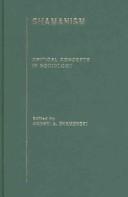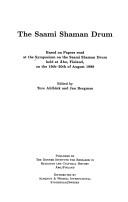| Listing 1 - 10 of 23 | << page >> |
Sort by
|
Book
ISBN: 3534174739 Year: 2004 Publisher: Darmstadt Wissenschaftliche Buchgesellschaft
Abstract | Keywords | Export | Availability | Bookmark
 Loading...
Loading...Choose an application
- Reference Manager
- EndNote
- RefWorks (Direct export to RefWorks)
291.612 --- 291.612 Sjamanisme. Shamanisme --- Sjamanisme. Shamanisme --- Comparative religion

ISBN: 0415311926 0415332478 0415332486 0415332494 Year: 2004 Volume: *1
Abstract | Keywords | Export | Availability | Bookmark
 Loading...
Loading...Choose an application
- Reference Manager
- EndNote
- RefWorks (Direct export to RefWorks)
Chamanisme --- Shamanism --- Sjamanisme --- 291.612 --- Sjamanisme. Shamanisme --- Shamanism. --- 291.612 Sjamanisme. Shamanisme

ISBN: 9780195172317 0195172310 0199785759 0199883793 9786611156466 0198038496 1281156469 1435619587 Year: 2007 Publisher: Oxford: Oxford university press,
Abstract | Keywords | Export | Availability | Bookmark
 Loading...
Loading...Choose an application
- Reference Manager
- EndNote
- RefWorks (Direct export to RefWorks)
For the past forty years shamanism has drawn increasing attention among the general public and academics. There is an enormous literature on shamanism, but no one has tried to understand why and how Western intellectual and popular culture became so fascinated with the topic. Behind fictional and non-fictional works on shamanism, Andrei A. Znamenski uncovers an exciting story that mirrors changing Western attitudes toward the primitive. The Beauty of the Primitive explores how shamanism, an obscure word introduced by the eighteenth-century German explorers of Siberia, entered Western humanities and social sciences, and has now become a powerful idiom used by nature and pagan communities to situate their spiritual quests and anti-modernity sentiments. The major characters of The Beauty of the Primitive are past and present Western scholars, writers, explorers, and spiritual seekers with a variety of views on shamanism. Moving from Enlightenment and Romantic writers and Russian exile ethnographers to the anthropology of Franz Boas to Mircea Eliade and Carlos Castaneda, Znamenski details how the shamanism idiom was gradually transplanted from Siberia to the Native American scene and beyond. He also looks into the circumstances that prompted scholars and writers at first to marginalize shamanism as a mental disorder and then to recast it as high spiritual wisdom in the 1960s and the 1970s. Linking the growing interest in shamanism to the rise of anti-modernism in Western culture and intellectual life, Znamenski examines the role that anthropology, psychology, environmentalism, and Native Americana have played in the emergence of neo-shamanism. He discusses the sources that inspire Western neo-shamans and seeks to explain why lately many of these spiritual seekers have increasingly moved away from non-Western tradition to European folklore. A work of intellectual discovery, The Beauty of the Primitive shows how scholars, writers, and spiritual seekers shape their
Shamanism. --- Shamanism --- -291.612 --- 291.612 --- Religions --- Sjamanisme. Shamanisme --- 291.612 Sjamanisme. Shamanisme

ISBN: 2130526330 Year: 2002 Volume: 2968 Publisher: Paris : Presses universitaires de France,
Abstract | Keywords | Export | Availability | Bookmark
 Loading...
Loading...Choose an application
- Reference Manager
- EndNote
- RefWorks (Direct export to RefWorks)
Chamanisme. --- Chamanisme --- Shamans --- Chamans --- 291.612 --- Désherbage --- 291.612 Sjamanisme. Shamanisme --- Sjamanisme. Shamanisme --- Deselectie --- Shamanism
Book
ISBN: 9043506761 Year: 2003 Publisher: Kampen Kok
Abstract | Keywords | Export | Availability | Bookmark
 Loading...
Loading...Choose an application
- Reference Manager
- EndNote
- RefWorks (Direct export to RefWorks)
Shamanism --- 291.612 --- 291.612 Sjamanisme. Shamanisme --- Sjamanisme. Shamanisme --- Religions --- Comparative religion --- sjamanisme --- cultuur --- traditie --- rituelen --- genezing --- heling --- licht
Book
ISBN: 392357679X 9783923576791 Year: 1991 Publisher: Duisburg: Stadt Duisburg,
Abstract | Keywords | Export | Availability | Bookmark
 Loading...
Loading...Choose an application
- Reference Manager
- EndNote
- RefWorks (Direct export to RefWorks)
shamanism --- Comparative religion --- Folklore --- Greenland --- Siberia --- North America --- Scandinavia and Iceland --- Shamanism. --- 291.612 --- Shamanism --- Religions --- Sjamanisme. Shamanisme --- Exhibitions --- 291.612 Sjamanisme. Shamanisme
Book
ISBN: 0691069239 1306985765 0691602565 1400862647 Year: 1992 Publisher: Princeton (N.J.) Princeton University Press
Abstract | Keywords | Export | Availability | Bookmark
 Loading...
Loading...Choose an application
- Reference Manager
- EndNote
- RefWorks (Direct export to RefWorks)
Pursuing special experiences that take them to the brink of permanent madness or death, men and women in every age have "returned" to heal and comfort their fellow human beings--and these shamans have fascinated students of society from Herodotus to Mircea Eliade. Gloria Flaherty's book is about the first Western encounters with shamanic peoples and practices. Flaherty makes us see the eighteenth century as an age in which explorers were fascinating all Europe with tales of shamans who accomplished a "self-induced cure for a self-induced fit." Reports from what must have seemed a forbidden world of strange rites and moral licentiousness came from botanists, geographers, missionaries, and other travelers of the period, and these accounts created such a stir that they permeated caf talk, journal articles, and learned debates, giving rise to plays, encyclopedia articles, art, and operas about shamanism. The first part of the book describes in rich detail how information about shamanism entered the intellectual mainstream of the eighteenth century. In the second part Flaherty analyzes the artistic and critical implications of that process. In so doing, she offers remarkable chapters on Diderot, Herder, Goethe, and the cult of the genius of Mozart, as well as a chapter devoted to a new reading of Goethe's Faust that views Faust as the modern shaman.Originally published in 1992.The Princeton Legacy Library uses the latest print-on-demand technology to again make available previously out-of-print books from the distinguished backlist of Princeton University Press. These editions preserve the original texts of these important books while presenting them in durable paperback and hardcover editions. The goal of the Princeton Legacy Library is to vastly increase access to the rich scholarly heritage found in the thousands of books published by Princeton University Press since its founding in 1905.
291.612 --- Shamanism --- Religions --- Sjamanisme. Shamanisme --- Europe --- Council of Europe countries --- Eastern Hemisphere --- Eurasia --- Intellectual life --- -291.612 --- 291.612 Sjamanisme. Shamanisme --- -Shamanism --- Shamanism.
Book
ISBN: 9068322737 Year: 1997 Publisher: Amsterdam : Koninklijk Instituut voor de Tropen,
Abstract | Keywords | Export | Availability | Bookmark
 Loading...
Loading...Choose an application
- Reference Manager
- EndNote
- RefWorks (Direct export to RefWorks)
291.612 --- 291.612 Sjamanisme. Shamanisme --- Sjamanisme. Shamanisme --- shamanism --- Siberia --- East Africa --- Amazon Valey --- Chamanisme --- Shamanism --- Sjamanisme --- Amazon Valley --- Comparative religion --- Indonesia --- North America
Book
ISBN: 9782849520925 Year: 2010 Publisher: Paris Editions Imago
Abstract | Keywords | Export | Availability | Bookmark
 Loading...
Loading...Choose an application
- Reference Manager
- EndNote
- RefWorks (Direct export to RefWorks)
plantes psychotropes --- initiation --- thérapie --- quêtes de soi --- nouvelles spiritualités --- shamanisme --- toxicomanie --- New Age

ISBN: 9516498590 9789516498594 Year: 1991 Volume: 14 Publisher: Åbo : Donner institute for research in religious and cultural history,
Abstract | Keywords | Export | Availability | Bookmark
 Loading...
Loading...Choose an application
- Reference Manager
- EndNote
- RefWorks (Direct export to RefWorks)
Sami (European people) --- Drum --- Shamanism --- Rites and ceremonies --- Music --- Religion --- Religious aspects --- 291.612 --- -Sami (European people) --- -Shamanism --- -Religions --- Laplanders --- Lapps --- Saam (European people) --- Saame (European people) --- Saami (European people) --- Same (European people) --- Samer (European people) --- Samit (European people) --- Arctic peoples --- Ethnology --- Finno-Ugrians --- Drums (Musical instruments) --- Percussion instruments --- Sjamanisme. Shamanisme --- -Music --- -Sjamanisme. Shamanisme --- 291.612 Sjamanisme. Shamanisme --- -291.612 Sjamanisme. Shamanisme --- Religions --- Sami (European people) - Rites and ceremonies - Congresses. --- Sami (European people) - Music - Congresses. --- Sami (European people) - Religion - Congresses. --- Drum - Religious aspects - Scandinavia - Congresses. --- Shamanism - Scandinavia - Congresses. --- Ethnologie --- Finlande --- Tambour --- Chamanisme --- Religion dans l'art
| Listing 1 - 10 of 23 | << page >> |
Sort by
|

 Search
Search Feedback
Feedback About UniCat
About UniCat  Help
Help News
News